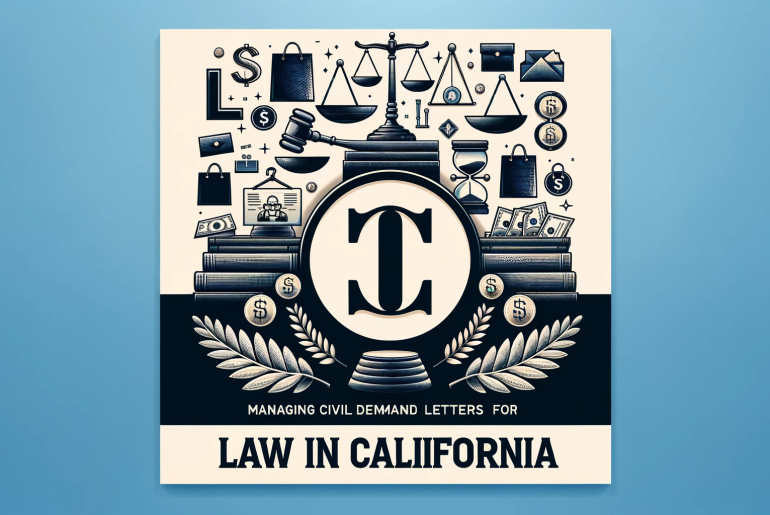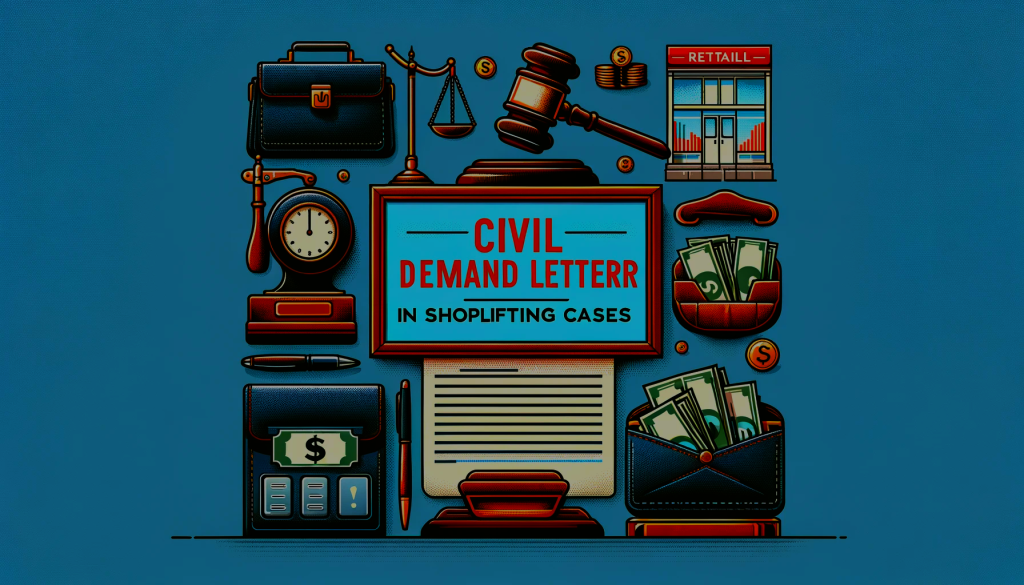How to manage Civil Demand Letters for Shoplifting

Receiving a Civil Demand Letters for Shoplifting in the aftermath of a shoplifting incident can be an alarming and confusing experience. These letters often demand payment to cover losses and penalties related to the alleged theft, leaving recipients to grapple with the decision of whether to comply. The uncertainty of the situation is compounded by the fear of potential legal repercussions and the embarrassment of the accusation. This article delves into the complexities of civil demand letters, examining the legal standing of such requests and the implications of different responses. By dissecting the possible outcomes of paying or not paying the demand, as well as discussing how to handle subsequent criminal charges, this piece aims to shed light on the path forward for those facing this dilemma, empowering you to make an informed and judicious decision.

Managing Civil Demand Letters for Shoplifting:
- Don’t Panic: Stay calm and understand that this is a common legal practice.
- Read Carefully: Review the letter for details about the demand.
- Legal Consultation: Seek advice from an attorney before responding.
- Verify Legitimacy: Confirm that the letter is from a legitimate source.
- Consider the Consequences: Understand the potential outcomes of paying or not paying.
- Keep Records: Document all communications and decisions made.
- Negotiate if Possible: Discuss with your lawyer the possibility of negotiating the amount.
- Make an Informed Decision: Decide to pay or not based on legal advice and personal circumstances.
- Follow Up: If you pay, ensure the matter is resolved; if not, prepare for possible legal action.
Should You Pay a Demand Letter in a Shoplifting Case?
When confronted with a civil demand letter following a shoplifting incident, the impulse to quickly settle the matter is understandable. However, the decision to pay should not be taken lightly, as it may not offer the resolution you hope for. Here are key considerations to weigh before reaching for your checkbook:
Legal Enforceability:
- State Laws: The enforceability of civil demand letters varies by state. Some states allow retailers to seek civil penalties, while others do not.
- Attorney Consultation: A lawyer can provide advice on your state’s laws and the legitimacy of the demand.
Proportionality of the Demand:
- Retail Loss vs. Demand: Compare the value of the alleged shoplifted items to the amount demanded. Retailers may demand more than the value of the loss as a penalty.
- Standard Practice: Research or ask a lawyer whether the requested amount aligns with standard practice for such cases.
If You Refuse to Pay?
Choosing not to comply with a civil demand letter is a valid option, but it’s important to be aware of the potential consequences. Here’s what might happen:
Risk of Legal Action:
- Merchant’s Next Steps: The retailer may choose to escalate the issue to small claims court to seek the demanded amount legally.
- Costs of Litigation: If the case goes to court, you may incur additional costs, such as legal fees and court costs, especially if the retailer wins the case.
Impact on Credit Score:
- Potential for Judgment: If the retailer takes you to court and wins, the judgment may appear on your credit report.
- Credit Score Effect: A judgment can negatively affect your credit score, making it more difficult to obtain loans or credit in the future.
Before deciding to ignore a civil demand letter, it’s wise to weigh these potential outcomes.
If You Pay, Can You Still Be Prosecuted?
Payment of a civil demand letter is not a shield against criminal prosecution. Here’s why:
Distinct Legal Proceedings:
- Civil vs. Criminal: Civil demands and criminal charges are handled in separate legal arenas. Payment settles the civil matter but has no sway over the criminal side.
- No Legal Immunity: A payment is not an admission of guilt, nor does it grant immunity from potential criminal charges.
Documentation is Key:
- Proof of Payment: Always document your payment thoroughly. This includes saving receipts, confirmation numbers, and any correspondence.
- Future Reference: Such records can be crucial if the incident leads to further legal action, as they show compliance with the civil demand.
It’s crucial to understand that paying a civil demand letter may close that particular chapter, but it doesn’t close the book on the matter entirely. The possibility of criminal charges remains, irrespective of payment, especially if the evidence supports such action. Therefore, maintaining a record of payment is essential, as it may influence or inform subsequent legal processes.
How Do I Fight a Shoplifting Charge?
If you’re faced with a shoplifting charge, taking proactive and informed steps is crucial in mounting a defense. Here’s how you can approach the situation:
Secure Legal Representation:
- Specialized Attorney: Enlist a criminal defense attorney with experience in shoplifting cases. They can navigate the legal system and advise on the best course of action.
- Defense Strategy: Your attorney can help develop a defense strategy based on the specifics of your case, which may include questioning the evidence or negotiating a plea.
Compile Evidence:
- Surveillance Footage: Obtain any available video surveillance that may capture the incident, as it could be critical in proving your case.
- Witness Statements: Gather statements from witnesses who can corroborate your account of events or attest to your character.
- Receipts or Alibis: Secure any receipts or alibis that can establish you were elsewhere at the time of the alleged shoplifting.
Prepare for Court:
- Understand the Charges: Be clear on what you are being charged with and the potential penalties.
- Know Your Rights: Familiarize yourself with your legal rights, including the right to remain silent and the right to legal representation.
- Court Conduct: Follow your attorney’s guidance on how to dress, behave, and speak in court.
Fighting a shoplifting charge can be complex, but with the right preparation and legal support, you can ensure that your side of the story is heard and that your rights are upheld. Remember, each action you take should be considered carefully, ideally under the guidance of your attorney, as it could significantly influence the outcome of your case.
Conclusion:
Deciding whether to pay a civil demand letter for shoplifting is not straightforward. Each case is unique, and while paying might seem like a simple resolution, it comes with no guarantees regarding criminal prosecution. Refusal to pay carries its own risks and potential for legal escalation. It is vital to seek legal advice to understand your rights and the best course of action based on your specific circumstances. This article has laid out the considerations and possible repercussions to help guide you in making an informed decision.



